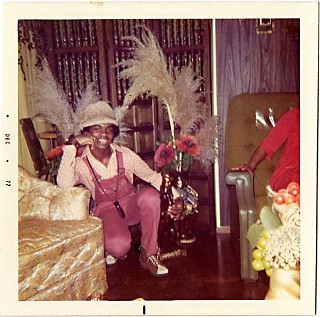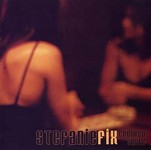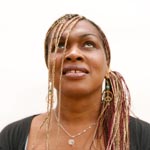This Is My Life
LZ Love's message
By Margaret Moser, Fri., June 4, 2010

LZ Love's gaze lifts, and her light brown eyes shine. Her face displays the high, sculpted cheekbones of her mother's family – black, French, Native American. Her skin bears a coppery sheen within its deep bronze tone, sunlight filtering through the blinds and casting a glow accentuating the curve of her shoulder and the swell of her breasts. In her slender fingers rests a copy of her new CD, Mysterious.
This is standard music business 101: An artist has a new album coming out and wants to promote it. There are stories to be told about making it, recording it, writing it, plus the inspirations, the sessions, the production. Generally these are intertwined with the artist's or the band's story – they all have one, in varying degrees of significance and interest.
Love's story is different. She moved to Austin some seven years ago from San Francisco and found a roots niche in local gospel brunches with her gutbucket blues. Possessing a voice that immediately put her in the highest rank of vocalists in town, she's coming out about her real musical love, dance music. And LZ Love has something else to share.
She was born a man.
Love and Happiness
In the natural course of songwriting, artists reveal their stories. In LZ Love's new CD, Mysterious, there's no mystery. She tells her story without shame or artifice, and the chapters are her song titles: "Mysterious." "This Is My Life." "Water Under the Bridge." But this isn't the music Austin's known LZ Love for as she's eked out her local niche singing soul-stirring blues and blues-saturated gospel.
"In Austin, the music was country and blues," she nods. "And I knew I wasn't a country singer, but I knew I could bring a Southern vibe to blues and country-oriented stuff. That's why I wrote songs like 'Higher Ground' with more slide guitar. It worked for me, because I got accepted on a lot of shows – Stephen Marley, the Neville Brothers.
"But I was doing a lot of different things to survive, to fit in: gospel brunches at Stubb's, Threadgill's, Maria's. They were good, but I felt I was sticking to a genre from my past. I've been singing gospel since I was 5. It's a no-brainer for me to sing from that place. It's where I sing from anyway. Yet by spreading myself in all these directions, my audience was confused as to when it was important to see me perform.
"And I didn't need a guitar strapped on me like everyone else in Austin. That's not how I perform; I write my songs on keyboard. I needed to pull back and reevaluate, so I did one last show at the Saxon, and afterward Matt Smith from the Monstas came up to me and said, 'I want to produce your next record.'"
LZ Love spent the 1980s and 1990s performing and touring, recording hit dance singles in Europe, and making a name doing studio gigs. Her reputation for big vocals brought her to the attention of Michael Franti, who drafted her for two tracks on Spearhead's acclaimed Yellfire!. Yet Love found unexpected kinship with Austin musicians.
"I loved my brother Stephen Bruton, which is why I recorded his song 'Spirit World' on Mysterious. I told him he wrote it for me. That song made me feel welcome. I performed it with him several times. He said, 'You sing it better than me.' I didn't know when he wrote it that he was going to be in the spirit world."
Matt Smith's offer to produce came at the right time for LZ Love. "He said: 'If I work with you, you're going to have to write from a very deep place. You got a story, a message.' And I do – being transsexual, moving from California to Austin, trying to fit into a different scene, being a woman of color.
"People say they don't, but some still judge people by pedigree here. Some here still want someone white playing guitar. This might be part of the South, but this is the 21st century. We're in a whole new world.
"That's why I was inspired to write 'New Life.' Things that used to fit in the cubes don't anymore. Things that once fit in a circle don't anymore. Obama. Times are different."
I Feel Love
Times were quite different indeed for young Arnold Elzy. Born in Chicago and relocated to the Bay area at an early age, he found pleasure singing gospel in church, but other, decidedly feminine interests occupied his little-boy world. Though he was 16 before he told his mother, "I am different," the evidence showed early. LZ Love points to a school photo of 8-year-old Arnold, beaming brightly at the camera.
"I'm wearing hair grease for lip gloss. Look at this one: a pink jumpsuit. I'm 13.
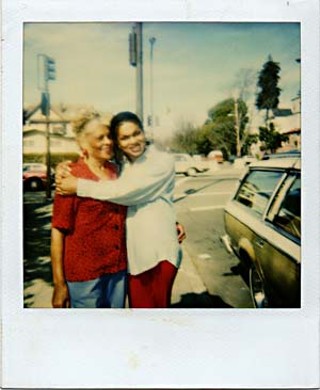
"I was the fashionista in my family," she laughs. "My sisters were wearing my clothes, little things I was buying. I'd find them, and they'd be stretched out. I was wearing their things, too."
The early 1980s in San Francisco were a glorious, glittery time to hoist freak flags if you were gay, maybe-gay, bi, or drag. The previous decade, with its tidal wave of post-Stonewall gay culture, even took its siren call mainstream. That thumping bass drum defined a genre that fostered modern dance music, DJs, 12-inch singles, industrial music, and New Wave. Disco was DIY music that spoke an international language. Its common denominator was the dance floor and a beat banishing everything but the desire to be in the amyl nitrate pulse of the music.
Disco's takeover of popular music was seen as a mass homogenization with a mindless beat. In fact, disco ruled as a most progressive, culturally connected, and accessible sound. And disco represented musical subcultures: black, Latino, female, gay. Where, then, was there a better place to be walking a gender tightrope in high heels than San Francisco, always a town for misfits and rebels? Neo-theatrical groups such as the Cockettes used the port city as a staging ground for outrageous performances, bedecked in makeup, vintage dresses, feathers, glitter, and whatever geegaws they wore that sparkled.
From the Cockettes emerged Sylvester James, but he only used one name. Sylvester radiated black-is-beautiful majesty. Handsome as a man, more attractive in drag, he could also sing both in an elastic tenor and a strong falsetto. He was unflappable, unstoppable, and for a time, on the blitz track to unique success that included opening for the Rolling Stones, a role in Bette Midler's The Rose, three Billboard Awards, and high-charting disco hits that defined their era, including "You Make Me Feel (Mighty Real)," "Dance (Disco Heat)," and the Patrick Cowley-produced "Do Ya Wanna Funk." More than Gloria Gaynor, Thelma Houston, and Donna Summer, Sylvester literally stood head and shoulders above the other disco queens.
"Sylvester would walk in as a beautiful gay man with his drag and start painting his face, transforming before your eyes," remembers Love. "And when Miss Thing was finished, she was a radiant, outrageous, gorgeous black goddess. At Winterland, Sylvester would wear wings and fly to the stage. Watching Sylvester gave me the tools as a young teenager to put myself together.
"I got my first break with Sylvester when I was 16 years old. I was already experimenting with my androgyny, but Sylvester was one of the world's greatest drag queens ever, and I got to learn from the source. RuPaul, I love you, but Sylvester was the queen. And I love Lady Gaga doing disco, but Sylvester started all that. The Pointer Sisters were little girls singing in their father's church, then started singing backup for Sylvester. They would open the shows and tear the house down. Sylvester was on Blue Thumb Records then, and they dropped him and picked up the Pointer Sisters.
"Sylvester had many bands, including the Hot Band. Then he left and went to Europe, where he did the Billie Holiday thing. That was a tough time for him. He'd opened for the Stones and David Bowie, so he wasn't just a disco diva, a glitter queen. He was a rock star first. Then he fell from grace. It was tough times, and I watched him go from all that experience to having to play smaller rooms. It wasn't the Stones anymore."
Turn On Your Love Light
In the wake of flagging success, Sylvester revamped his band, dropping two female singers with powerful voices, and asked 16-year-old Arnold Elzy to join his act. The deposed vocalists – Martha Wash and Izora Rhodes – shortly found fame as the Weather Girls singing "It's Raining Men." Without the cushion of big voices, the teenager declined to join up with the flamboyant Sylvester, who died of complications from AIDS in 1988.

Love describes her life afterward as "living in the middle," trying life as a woman and pursuing her singing career. Transsexual? Transgender?
"Same thing," she explains. "Transsexual is a person who feels they were born in the wrong body. I felt that way as kid, like my school photo when I was 8 and wearing hair grease on my lips for lip gloss. The way my sisters acted, that's how I felt. I felt like I should be over there, a feeling of being misplaced. Your feelings inside aren't the same as your outer image. In my case, it was how I looked and how I felt, because I've always been androgynous.
"My female hormones have always been more dominant.
"I've had all the surgery I'm comfortable with. That's how I discuss what's inside my g-string. People that know anything else about me are those I have shared my bed with. And that's not many.
"I always tell men when they're about to hug me or touch me, that you must know one thing about me and that's that I'm transsexual. Some tranny girls lie and don't tell their men until it's time to take the g-string off. That's a danger zone, and I don't have to go there anymore. I always left it up to my men to tell their families. In a lot of cases they didn't know. These men were either bi or straight.
"I don't go recruiting straight men. I don't go recruiting anyone.
"I didn't have long-term relationships until I became transsexual. Even though I was young, living in the middle, in that other life, when I really started living full time, that's when companions came in my life: men that cared about me, men that I lived with, men who took me home to their families. Because I'm so passable, which I am grateful for, it made it easy for them to take me there and not explain.
"Many people in Austin don't know I am transsexual. Anyone who ever approached me or heard rumors, I always told them, but I wanted to talk about it, because I felt people needed to know me for me and my music. My music is just as important as my gender.
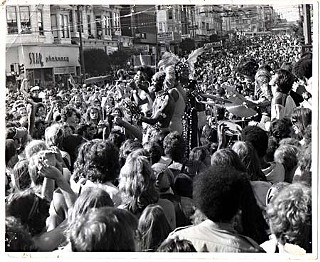
"I was outed before I came here, by Joel Selvin in the San Francisco Chronicle. It said my original name, Arnold Elzy, which was right; I switched my name around. But my gender wasn't an issue when I was in a room full of dancing and raving. I was in the room with gay, straight, transsexual, bi, whatever. So if anyone thought it was about gender, it wasn't when I was singing my butt off."
I'll Always Love My Mama
There's a joke that behind every gay man is a woman, and for LZ Love, that woman was her mother, Florida. Florida raised six children without their father around and still found time to offer much-needed support when Arnold was called "punk" or "faggot" by some of his sisters.
"Some of that stuff still hurts," Love agrees thoughtfully. "But my mother not only breathed life in me, she told me to live my life. She was comfortable with me being who I was because she knew who I was before I did."
School can be difficult for a teen struggling with gender issues and gigging with the likes of Sylvester, but Arnold Elzy finished correspondence school through mail. A boyfriend of Florida's loaned him money to take the courses, a kindness Love took the time to acknowledge.
"When I told my mother it was time for me to start living full time, she took me in her room with her beautiful dresser and jewelry and perfumes and all that. She said: 'Here's all my stuff. You're welcome to use anything I have.'"
In 1994, LZ Love rushed home from Europe. Her single "See the Light" rocked at No. 3 on the dance charts in England, but "my beautiful mother with her platinum blonde hair – Cajun, Native American, African-American, Southern – from Monroe, Louisiana," had fallen ill.
The family banded together to look after Florida, paying her insurance and other living expenses when all her state earnings went to the care facility. Love was with Florida in her last days, her mother's death opening a new chapter in her life.
"Living in San Francisco gave me the freedom I needed to express myself," acknowledges Love. "It allowed me to start building my life and collect the things I needed to live my life as a woman. Get my wardrobe, dress, and go out and see how people react, get used to being me. It was a great place to discover myself.
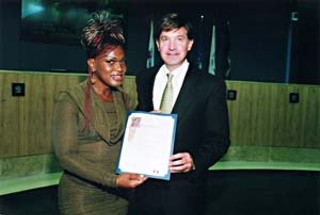
"I want to tell parents, 'Love your children for who they are so they can love themselves for that.' My mother always knew who I was. I came to her at the age of 16 and said: 'I feel I'm different. I don't know if I'm gay or what, but I am different.'
"She said: 'You've always been different, but honey, there's nothing wrong with being different. Whatever you do, be the best.' Before my father passed, he knew I was different, and he said, 'Whatever you do, hold your head up.'
"And that's why when kids get support from their parents, it's so powerful. You know you are loved by the people that brought you here, and it makes your life so much easier."
Love Makes the World Go 'Round
"Long and strange" hardly begins to describe the journey from Arnold Elzy to LZ Love, one that's spanned the globe, from Castro Street in San Francisco to performing with show bands in Japan, at discos in London, and yes, at taco joints in Austin.
LZ Love might have chosen to not play this card of hers in Austin. She could have followed the path of many a fine jazz vocalist here in town, but Love is a participant. She wanted to be part of the scene and not just a black or transgender or female jazz voice.
"I don't have to live in shame no more. That's part of the lyric in 'This Is My Life.' I know I got the right to live my life. It's got nothing to do with gender. I took Matt's advice to mean 'cover as many bases as possible' and get inside who you really are. And that's what it did for me. I wrote 'This Is My Life' about empowering yourself with who you are.
"I took that year break to focus on this music and direction. I feel it's done me justice in coming to terms with writing music that totally represents me and that I feel passionate about. This is one record that will do that for me."
Inside her cozy South Austin apartment, photographs of the faces shaping Love's life look down from the wall. They're a telling and varied grouping: Phyllis Hyman, Billie Holiday, James Brown, Josephine Baker, Andy Warhol, Stevie Ray Vaughan ("I connect and channel his spirit."), Mahalia Jackson, Minnie Riperton, Michael Jackson, Koko Taylor. There's her mother, Florida, and a photograph of an older man. LZ Love pauses, staring at it.
"This is my father. I'm just now able to put this picture up, because I struggled with where I felt he contributed to me and my sisters. He didn't contribute a lot, but he was my father, and I love him. The times I had with him and the words he said matched with the things my mother told me. I felt I wasn't going to be blessed until I was able to love them both."
Love turns her body so the photos surround her like a halo of souls.
"In San Francisco, I worked closer with the gay community, doing performances and gay pride. Here, I am involved. I go to Rain, Oilcan Harry's. I go to see friends perform, to have drinks, hang out, but I'm part of the music community. It adopted me. The musicians love me for who I am, my talent.
"I don't have to go through gay channels or gay doors to be who I am. My music makes me that."





